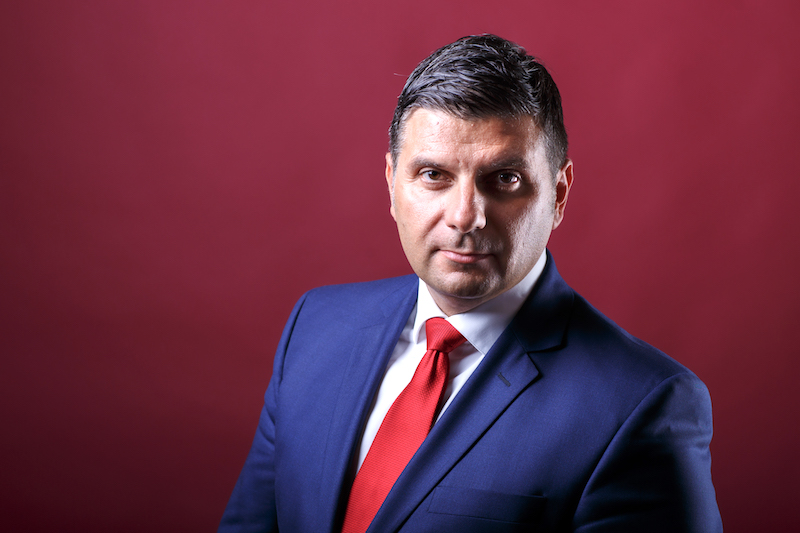Seeing that Romania was going in the right direction, economically and socially, made me want to come back to the country after almost two decades of living and working in the UK, says Alexandru Petrescu, Romanian Minister for Business Environment, Commerce and Entrepreneurship. He spoke to Andrew Wrobel about the prospects for the economy and the changes the government is implementing.
Romania has been quite a star, hasn’t it, with the highest growth in the European Union.
Well, yes but although the growth was around 4.8 per cent in Quarter four of 2016, and although we expect another 5.2 per cent in 2017, there’s still a long way to get to where we would like to be. This is because, despite these generous growth rates, the impact on the average Romanian has not yet met our expectations. So, we have to think of strategies that will have an immediate impact on each individual who is working and living in Romania.
My thoughts for the future are that if we manage to keep this momentum; if we manage to share out the work among the government, ministers and the cabinet, the same as we did at the start, I think the future is bright.
At the end of March we launched a new law for which the business community has been waiting a long time. It brings an element of flexibility and normality between the business environment and the controlled establishments belonging to state structures. We have also introduced an element of information and education, along with some reasonability in the existing controls. We believe that we’ll be able to bring a level of mediation that will benefit both the state and the businesses, using this legislation, and it is another step towards making the business environment friendlier and more attractive to investors.
I understand that this should have an immediate impact on the ease of doing business in Romania. Right now, Romania ranks 36th in the World Bank’s Doing Business. What are some other challenges when it comes to doing business in Romania?
Well, one of the challenges was the unpredictability of state authorities’ audit, and here I am speaking on behalf of small and medium businesses. If you don’t really know the outcome despite the fact that you, as an entrepreneur, think you are prepares for audit, then the outcome isn’t predictable or clear. With the new law we have not only clarified that but we’ve also created a unique portal where people can find every single piece of information they need; it is an ABC for entrepreneurs.
As far as setting up a company in Romania, that can be done today within three working days. We are now are working on an improved model and the aim is to bring the time of setting up of company down to one day only.
We also have a number of projects that offer support for entrepreneurs, especially new entrepreneurs. Our Start-Up Nation programme offers around €45,000 that is non-refundable with real understandable accessible for everybody. We also have programmes that encourage exports or internationalisation, with grants of up to €10,000, to create brand awareness or a website and to identify the best international fairs, exhibitions, and conferences where they can show their products or services. Finally, we have programmes that support the traditional craftsmanship entrepreneurs, especially if they come from the rural areas; that’s a business that we want to keep alive.

I recently spoke to Larisa Manastirli, Director for Bulgaria at the European Bank for Reconstruction and Development (EBRD), who said that Bulgarians could draw comparisons from the Romanian experience. At the same time, Nicholas Hammond, a British lawyer who’s been working in Romania for the last 25 years, wrote in an editorial that the government’s efforts to deal with corruption and organised crime are making doing business easier, but that the downside is that government officials sometimes delay making decisions, so as not to be thought of as corrupt.
I think if we assess the public feeling today, there is a level of reluctance to commit to projects because the broad scale of interpretation you find in the current legislation concerning corruption. Because there are no best practices concerning possible interpretations and because it is all so vague, it causes a certain degree of reluctance throughout the administration. Until there is clarification of where it stands and some lines are drawn between the guilty and the innocent, this state of events will remain and will continue to deeply affect the functionality of the state. This is a reality.
Also, there were massive demonstrations that took place in February.
Actually what happened, at the beginning of 2017, was an attempt to align the decision of the constitutional court. The government is obliged to take the recommendations of the constitutional court into consideration and then translate them into legislation.
Do you think that the situation, related to those demonstrations, is somehow detrimental to the country’s image?
Well, we all need clarification whether we are in the street or in our offices. The government has to comply with the recommendations of the constitutional court so the sooner it is done the better.
How do you think foreign investors view Romania now?
Well, Romania, as you said at the beginning, is now enjoying the highest increase in growth rate in Europe. We have a fiscal framework that’s extremely encouraging; in fact probably one of the most encouraging in Europe, and the evolution of this fiscal framework are making it even more attractive for investors. It’s auspicious. Romania has a highly educated workforce. I believe we have a government that’s very pro-business, and we have plenty of success stories from other investors, who are proving Romania is the place to invest.
Which sectors could be most rewarding for investors?
Generally all the sectors are open for investments. Of course, depending on the type of workforce and on the industry traditions, some could be more developed than others. As we stand today, we have seen very good growth in the automotive industry, and there are over 600 companies supplying the automotive industry in Romania. So let’s say the automotive sector, logistics, high technology, agriculture, energy, etc. These are the sectors that investors find attractive in Romania.
From the government’s perspective, we have a strategy and throughout this strategy there is one word that pops up all the time — reindustrialisation. By that we mean a transition from exporting raw materials to exporting value-added products. We want to retain more of the production chain in the country, than we’ve been doing so far. I’ll give you a few examples and they’re real ones: We export tomatoes to Bulgaria, but we import tomato juice or we export wooden logs but we import wooden furniture or slightly more value-added wooden products.
In 2015, according to the World Investment Report, Romania attracted FDI worth almost $4.4 billion. How do you see 2016 and 2017?
FDI inflow needs to reflect the increased growth rate of Romania. As I said, we are looking at a 5.2 per cent growth rate and we seem to be well on the way to getting there. If we continue to stay focused on translating the fiscal framework amendments into reality, we will succeed. We have cut the VAT rate from 24 per cent to 20 per cent and we are planning another decrease of one per cent. The dividend tax rate will go down from 16 per cent to five per cent.

In 2007, Romania joined the EU. How do you see the changes over the decade?
Well, we are probably one of the most pro-Transatlantic and pro-EU countries in Europe. Romania’s joining the EU was also a common goal across the political spectrum and one of those situations when all the parties rallied behind a single goal. I see that after ten years of being in the EU, Romania is a blossoming and flourishing country.
Of course, I still believe we have to work hard, but there’s the prospect of further improvement. We have to improve the way we absorb EU funds. We are still lagging behind with infrastructure. We are simplifying the public procurement legislation.
Do you think that Romania was ready for EU accession in 2007?
I believe there are two elements to being ready and compliant. Of course, there’s the economic one that can be accelerated by joining the EU. I understand those who say maybe we were not ready but by joining the EU, we have become compliant faster, and we have introduced more reforms, so it had proved to be beneficial for the country, and for the EU. We now have a better economy in Romania.
Then from the people’s perspective as concerns the feeling of being European and in the EU, if we had not joined EU at the moment that we did, it would have impacted negatively on the amount of European feeling that we had.
How about the labour force? We know Romanians are well-educated but quite a few of them have emigrated; for example, to the UK. Is there a way of attracting them back to the country?
Yes, it is a challenge because some of the most valuable Romanians are now living abroad; some of the most determined, creative, adaptable and willing to take their lives into their own hands. When they say ‘abroad I can do better and faster than here in Romania’ they show that determination. We would love to have all those qualities here.
I, myself, studied and worked in the UK for almost two decades and I that made me a prime-target of politicians’ diaspora-orientated programmes however, I don’t believe in these programmes because they didn’t work for me. While I was out of the country, there was one thing that could have attracted me back and that was the feeling that the country is going the right direction, economically: that it is fighting corruption and removing the red tape. That was the best way to make me come back to Romania.
And then you did come back, in 2012.
Yes, between 1995 and 2012 I worked in financial services and I was involved with Romania quite a lot in my professional capacity – I had an important portfolio of contacts throughout the private and state sectors. I have had two life-changing opportunities. The first was when I left Romania for England, and the second was when I left England to return to Romania. I don’t regret either of them.

